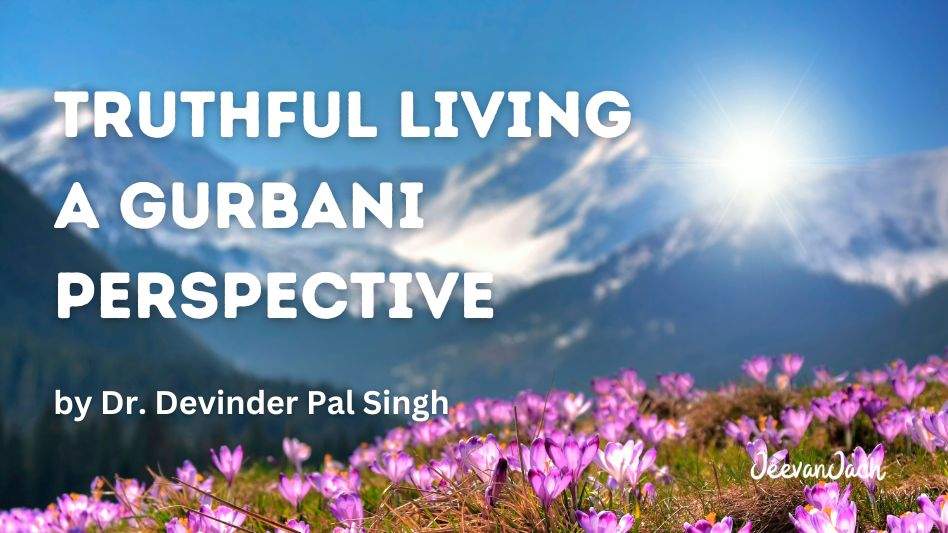
We’ve all heard of this term – ‘Truthful Living’, and somehow most of us tend to think that, “Hey! I’m earning my income honestly! I don’t cheat anyone! I don’t tell lies! I go to the Gurdwara every Sunday. I give donations. Isn’t this considered truthful living?” Wait! Let’s take a look at what is the concept of #TruthfulLiving according to Gurbani. Dr. Devinder Pal Singh shares his findings.
Truthful living is a central concept in Sikhism. It highlights the importance of living a life based on truth, honesty, and integrity. According to Sikhism, living a truthful life is essential for spiritual growth and leading a fulfilling and purposeful life.
The foundation of truthful living in Sikhism is the concept of ‘Sat,’ which means truth or reality. Sikhism emphasizes the importance of seeking and living in harmony with the ultimate truth, which is believed to be embodied in the teachings of the Guru Granth Sahib [1].
Truthful living involves aligning one’s thoughts, words, and actions with this ultimate truth. Guru Nanak emphasizes the importance of truthful living as:
ਸਚਹੁ ਓਰੈ ਸਭੁ ਕੋ ਉਪਰਿ ਸਚੁ ਆਚਾਰੁ ॥
Sacẖahu orai sabẖ ko upar sacẖ ācẖār.
Truth is the highest virtue, but higher still is truthful living. (Mehla 1, SGGS 62)
Honesty
One of the major principles of truthful living in Sikhism is honesty [2-3]. Sikhs are expected to be honest in all their dealings and interactions with others. It includes being truthful in their speech, actions, and intentions.
Sikhism teaches that honesty is a moral virtue and a spiritual practice that leads to inner peace and enlightenment. Advising on the daily routine of a devotee, Guru Nanak proclaims:
ਪਹਿਲਾ ਸਚੁ ਹਲਾਲ ਦੁਇ ਤੀਜਾ ਖੈਰ ਖੁਦਾਇ ॥
Pahilā sacẖ halāl ḏu▫e ṯījā kẖair kẖuḏā▫e.
Let (you adopt) firstly truthfulness, secondly honest living, and thirdly charity in the love of God. (Mehl 1, SGGS, p. 141)
Humility
Another critical aspect of truthful living in Sikhism is humility. Sikhs are encouraged to cultivate a sense of humility and modesty in their daily lives. It involves acknowledging one’s limitations and weaknesses and seeking to learn from others.
Humility is an essential quality for spiritual growth and is closely tied to the concept of ‘Seva,’ which means selfless service.
ਮਿਠਤੁ ਨੀਵੀ ਨਾਨਕਾ ਗੁਣ ਚੰਗਿਆਈਆ ਤਤੁ ॥
Miṯẖaṯ nīvī nānkā guṇ cẖang▫ā▫ī▫ā ṯaṯ.
Sweetness and humility, O Nanak, are the essence of virtue and goodness. (Mehla 1, SGGS 13)
ਸੁਖੁ ਹੋਵੈ ਸੇਵ ਕਮਾਣੀਆ ॥
Sukẖ hovai sev kamāṇī▫ā.
you shall find peace, doing selfless service. (Mehla 1, SGGS 19)
Harmony With Nature
Sikhism also emphasizes the importance of living harmoniously with nature and the environment [4]. Sikhs are expected to respect and protect the natural world and live in a way that minimizes environmental harm.
It includes practicing sustainability, reducing waste, and being mindful of one’s consumption habits [5]. Guru Nanak asserts that nature is the manifestation of God, who is all-pervading. Therefore, he urges us to have a harmonious relationship with it.
ਨਾਨਕ ਸਚ ਦਾਤਾਰੁ ਸਿਨਾਖਤੁ ਕੁਦਰਤੀ ॥
Nānak sacẖ ḏāṯār sinākẖaṯ kuḏraṯī.
Nanak says that the True One (God) is a great benefactor. He is revealed through His All-powerful Creative Nature. (Mehla 1, SGGS 141)
Align Thoughts, Words and Actions
The Jap hymns, also known as Japji Sahib, are a collection of sacred hymns composed by Guru Nanak, the first Sikh Guru, which forms the basis of Sikh daily prayer [6]. The Jap hymns contains teachings on various spiritual topics, including the importance of truthful living.
According to Guru Nanak, truthful living involves aligning one’s thoughts, words, and actions with the ultimate truth, which is the divine reality that underlies all existence. In the Jap hymns, he teaches that the path to truthful living begins with recognizing the fundamental unity of all creation and cultivating a sense of oneness with the divine [7].
Follow The Hukam
One of the fundamental teachings on truthful living in the Jap hymns is the importance of living following one’s true nature. Guru Nanak teaches that everyone has a unique purpose and destiny and that living in alignment with this purpose is essential for a truthful and fulfilling life.
It involves being true to oneself and following the Hukam (Divine Command) rather than conforming to the expectations of others or society. Guru Nanak proclaims it as:
ਕਿਵ ਸਚਿਆਰਾ ਹੋਈਐ ਕਿਵ ਕੂੜੈ ਤੁਟੈ ਪਾਲਿ॥
ਹੁਕਮਿ ਰਜਾਈ ਚਲਣਾ ਨਾਨਕ ਲਿਖਿਆ ਨਾਲਿ ॥
Kiv sacẖi▫ārā ho▫ī▫ai kiv kūrhai ṯutai pāl. Hukam rajā▫ī cẖalṇā Nānak likẖi▫ā nāl.
How can you become truthful? And how can the veil of illusion be torn away? Nanak says that (to be a truthful person) one must follow the Hukam (Divine Command). (Mehla 1, SGGS 1)
Speak The Truth
Another crucial aspect of truthful living in the Jap hymns is the importance of honesty and integrity. Guru Nanak emphasizes the significance of speaking the truth and living with integrity in all one’s dealings with others.
He teaches that falsehood and deception are barriers to spiritual growth and that living in truthfulness is essential for developing a deep and abiding connection with the divine. Guru Nanak highlights the importance of acquiring spiritual wisdom, as:
ਗਿਆਨ ਵਿਹੂਣਾ ਕਥਿ ਕਥਿ ਲੂਝੈ ॥
Gi▫ān vihūṇā kath kath lūjẖai.
Without spiritual wisdom, they (people) babble and argue. (Mehla 1, SGGS 466)
Be Selfless, Not Selfish
In addition to honesty and integrity, the Jap hymns also stresses the importance of humility and selflessness. Guru Nanak teaches that spiritual growth and enlightenment come from serving others and living humbly.
He proclaims the significance of putting the needs of others before one’s own and cultivating a sense of compassion and kindness towards all beings. Guru Nanak articulates:
ਭੁਗਤਿ ਗਿਆਨੁ ਦਇਆ ਭੰਡਾਰਣਿ ਘਟਿ ਘਟਿ ਵਾਜਹਿ ਨਾਦ ॥
Bẖugaṯ gi▫ān ḏa▫i▫ā bẖandāraṇ gẖat gẖat vājėh nāḏ.
Let spiritual wisdom be your sustenance and compassion your provider (for others). Let (you hear) the Sound-current of the love of God everywhere. (Mehla 1, SGGS 6)
Be Accountable and Responsible
Truthful living is crucial in the modern context for several reasons. In today’s world, there is a growing sense of uncertainty and distrust in many areas of life, including politics, business, and personal relationships. It has led to a breakdown in trust and a general disillusionment with the institutions and systems that govern our lives.
In this context, truthful living provides a foundation for building trust, fostering transparency, and creating a sense of accountability. When individuals and institutions operate with honesty and integrity, they are more likely to be trusted and respected by others. It, in turn, can lead to greater cooperation, collaboration, and positive outcomes.
Guru Nanak makes us aware of our responsibility and accountability for our actions. He says:
ਕੀਤਾ ਆਪੋ ਆਪਣਾ ਆਪੇ ਹੀ ਲੇਖਾ ਸੰਢੀਐ ॥
Kīṯā āpo āpṇā āpe hī lekẖā sandẖī▫ai.
Everyone receives rewards for his actions. The person’s account is adjusted accordingly (as per his good or evil acts). (Mehla 1, SGGS 473)
Social Justice and Equality
Moreover, truthful living is essential for promoting social justice and equality. In a world that is often marked by discrimination, prejudice, and inequality, living with honesty and integrity can help to challenge and dismantle these structures.
By bravely and firmly stating one’s beliefs and objections against injustice and advocating for truth and transparency, individuals and groups can help to create a more just and equitable society.
Guru Nanak asserts that it is a pious duty of a king (i.e., leader or judge) to provide justice to all without any discrimination. He says:
ਰਾਜੇ ਚੁਲੀ ਨਿਆਵ ਕੀ ਪੜਿਆ ਸਚੁ ਧਿਆਨੁ ॥
Rāje cẖulī ni▫āv kī paṛi▫ā sacẖ ḏẖi▫ān.
For the king, cleansing is justice; for the scholar, it is true meditation. (Mehla 1, SGGS 1240)
Protect The Environment
Finally, truthful living is crucial for promoting sustainability and protecting the environment. In a world that is facing significant environmental challenges, such as climate change and ecological degradation, living with honesty and integrity can help to create a more sustainable and resilient future.
By reducing waste, consuming responsibly, and advocating for environmentally conscious policies, individuals and groups can help mitigate human activities’ impact on the planet.
Life of Purpose, Service and Ethical Behavior
Sikhism emphasizes the importance of living a life of purpose, service, and ethical behavior by connecting with the divine and achieving spiritual enlightenment.
In this context, truthful living is an integrated approach that emphasizes spiritual growth and fulfillment through ethical and sustainable living. This way of life is crucial in the modern context because it promotes trust, transparency, accountability, social justice, equality, sustainability, and environmental protection.
By living with honesty and integrity, individuals and institutions can create a more just, equitable, and sustainable world for future generations.
References
- Sri Guru Granth Sahib, (SGGS), 1983 (Reprint), SGPC, Amritsar
- Singh, D. P. (2019, January). A Path to Truthful Living (Part -I), The Sikh Review, 67 (1), 25-32.
- Singh, D. P. (2019, February). A Path to Truthful Living (Part -II), The Sikh Review, 67 (2), 19-30.
- Singh, D. P. (2022). Natural Symbolism in Sri Guru Granth Sahib. Horizon J. Hum. Soc. Sci. Res. 4 (2), 1–7. https://doi. org/10.37534/bp.jhssr.2022.v4.n2.id1158.p1
- Singh, D. (2018). Science, and Sikhism – Conflict or Coherence, 2018, Singh Brothers, Amritsar, India.
- Talib, G. S. (1977). Japuji: The Immortal Prayer Chant.
- Singh, S. (2004). The Seeker’s path: Being an interpretation of Guru Nanak’s Japji. Orient Blackswan



